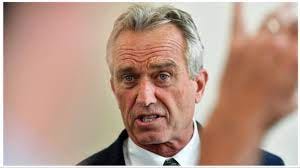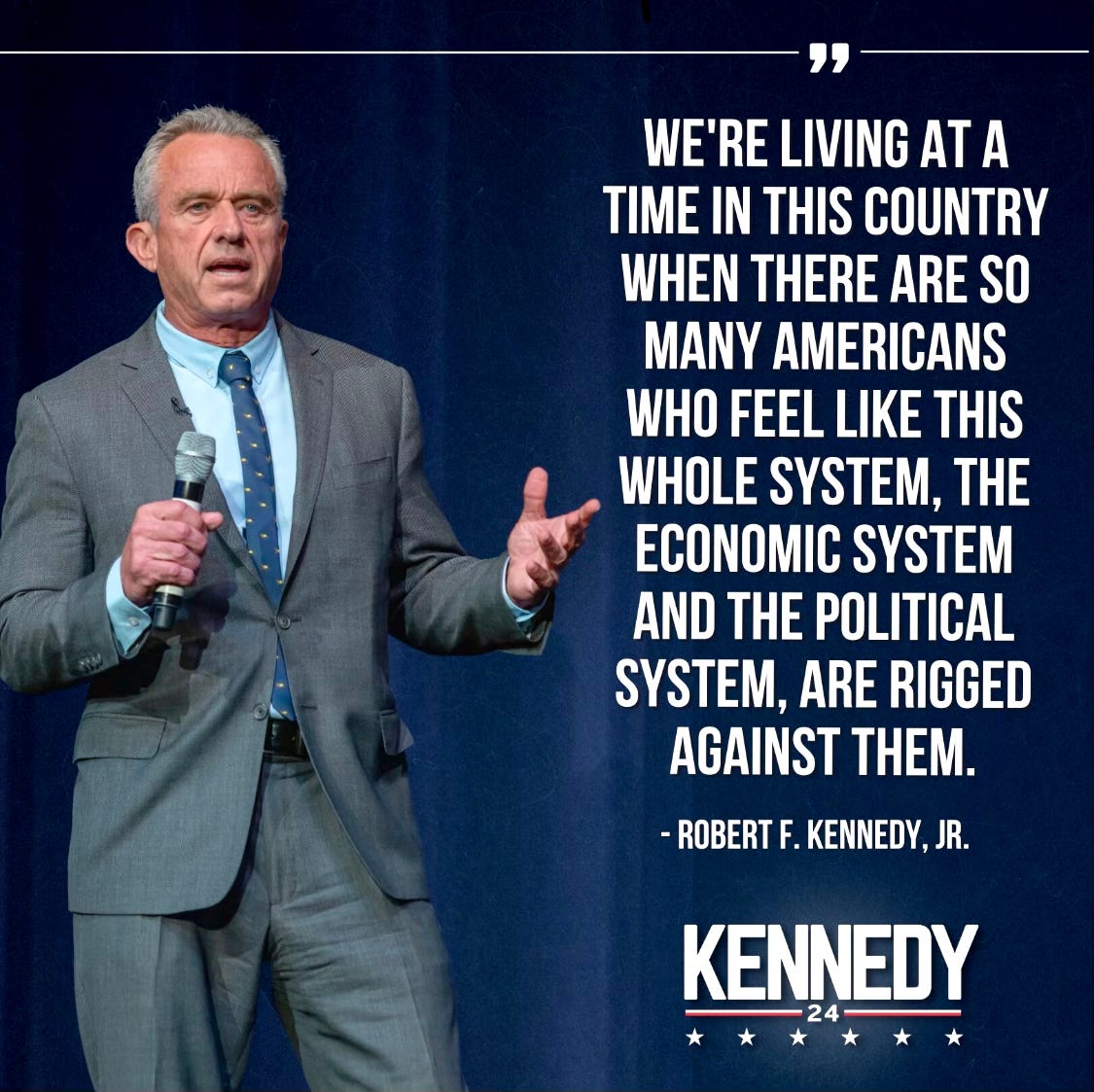Kennedy's Plan to Recharge the Soul of America
Plan includes promise to build free healing centers in depressed communities across the nation
“We’re living at a time in this country when there are so many American who feel like the whole system, the economic system and the political system, are rigged against them.” — Robert F. Kennedy Jr.
by Max Lockwood, Special to The Kennedy Beacon
The United States, like much of the world, is facing a monumental spiritual crisis, and it cannot be fixed by tweaking a law here or a policy there.
It is something that cuts much deeper because it goes beyond the psychological and material struggle, and touches the soul of the nation. America isn’t just at war with real or imagined enemies abroad, it is at war with itself. Our national morale is in decline, and our current government/corporate leadership is at a loss as to how to address the problem — and that’s assuming they believe it needs to be addressed at all.
Profound social and political divisions between us, such as a massive wealth gap, have created a level of financial insecurity and fear that we have not seen since the Great Depression. According to Income Inequality.org, tax cuts for the wealthy are the main driver. “The top U.S. marginal tax rate in 1979 was 70 percent, compared to just 37 percent today,” a report reads, and between 1979 and 2019, the wealth of the top .01 percent of households grew more than nine times as fast as that of the bottom 20% of earners. Between 2019 and 2023, according to Reuters, income inequality increased even more significantly.
Aside from economic anxiety, overt acts of racism and other social conflicts have intensified in recent years. Americans seem to be as cynical and divided as ever. Unlike the 1960s when cynicism lead to positive progressive action and the emergence of idealistic leadership of Martin Luther King Jr, Malcolm X, and Robert Kennedy Sr, among many others, the cynicism today seems to have bred many reactionary divisive leaders more interested in fostering and enhancing cynicism and nihilistic behavior vs. promoting cooperation and more productive problem solving.
As a result, these broader societal problems have produced more anxiety and mental stress, increasing the use of drugs and alcohol as a coping mechanism. According to the National Center for Drug Abuse Statistics, the economic and social cost of drug and alcohol abuse in 2023 has been 272 billion dollars. The Center further reports that:
Every day, 385 Americans die as a result of excessive alcohol use.
1 in 10 Americans over 12 have Alcohol Use Disorder/Alcoholism.
50% of Americans over 12 have tried illicit drugs at least once.
700 thousand drug overdose deaths since 2000.
The Federal budget spends approximately 35 billion a year on drug control/management programs.
In addition, a massive prison industry has emerged over the past 40 years, a direct result of then Senator Joe Biden’s 1986 crime bill, which led to racial bias in the criminal justice system, according to the Washington Post and his 1994 follow-up, the equally disastrousViolent Crime Control and Law Enforcement Act, according to the Atlantic Monthly.
These laws led to disproportionate numbers of Black and Brown people being sent to prison for low level drug offenses. Today, US prisons are a housing space for many Americans who suffer from addiction. The National Center for Drug Abuse Statistics reports that the US has one of the highest incarceration rates in the world. In 2021, the prison population stood at 1.2 million. Eighty-percent of prison inmates abuse or have abused drugs and alcohol; 244,000 people are sent to prison annually for drug related crimes.
The economic decline for working Americans combined with the escapism and immediate gratification available via social media and other Internet mind candy, and the disintegration of family and community cohesion have led to a troubling mental health crisis. And created fertile ground for addiction, Attention Deficit Disorder among our youth, anxiety and depression.
Robert F. Kennedy Jr, a self-admitted recovering drug addict, is running as an independent for the office of president of the United States. He, like many, believes that the two-party system has been corrupted by well paid lobbyists who represent corporate interests, making the government ineffective at addressing the basic needs of everyday, hard-working Americans.
Kennedy’s own struggles with addiction and mental health, and his subsequent successful work in recovery, give him a unique insight into the emotional and mental health problems many Americans face.
“I know what suffering American families are enduring, and it is something that is a high priority for me.” Referring to his uncle John F. Kennedy's program, which was a hallmark of that administration, he calls this initiative his Peace Corps program, saying, “I’m going to build these rehab centers all over the country.”
Kennedy will make healing our collective national and individual souls a priority.
In August, he visited country music singer Anthony Oliver’s estate in Virginia and committed to partner with Oliver and use his farm as a pilot for his vision.
Anthony’s song, Rich Men North of Richmond, became a viral sensation, with its rural, down home, country take on how the powerful elite class is crushing average Americans. After hearing it, Kennedy tweeted, “Now that is an extraordinary song — raw, yet intelligent; defiant, yet compassionate. It’s about working-class hardship. It is about low wages (‘bullshit pay’). It’s about degraded food supply, elite corruption, obesity, homelessness, despair.”
Kennedy plans to work with Anthony and create a model to be established nationally. “Anthony and I both hope that his homestead can serve as a pilot site for my proposal—announced in July—to build free healing centers in depressed communities across the nation, places that help reclaim a generation beset by depression, PTSD, loneliness, addiction and mental illness.”
Kennedy’s design for the program is based on the 12-step recovery model of Alcoholics Anonymous (AA), and the thinking of Bill Wilson. Wilson, who had attained some level of success on Wall Street in the 1920s, became a regular drinker. During the economic downturn caused by the Depression, his drinking got out of control and he, like many, lost most of his material wealth and his life was falling apart. He hit a spiritual and physical bottom and subsequently went on a journey of self discovery to reclaim his moral and ethical foundation. This led him to co-founding AA in 1935.
Wilson shared his path to recovery and formalized it into what became known as the first 12-step program as a means of addressing alcoholism. The program consists of 12 steps for recovery, which includes regular attendance at meetings with other recovering alcoholics. There is no hierarchy or medical oversight, it is simply people helping themselves and each other. But the core message of AA is that the disease of addiction to alcohol or any substance is more than just physical; it is also a spiritual crisis.
Over the past 80 plus years, 12-step recovery has helped millions of Americans, and people all around the world, heal their psychological and spiritual wounds from addiction and go on to live healthy and productive lives.
Kennedy’s plan: Rather than "warehouse our devastated young people [in prison]…it's time to turn our national attention to healing people instead."
Addiction and mental distress are clearly signs of much deeper forms of decay in individuals and the broader society. The use of drugs and alcohol, the blaming of others, the finger pointing, the anger and overall lack of healthy dialogue about how to deal with our personal issues and our relationship with other Americans and the society at large is a priority for RFK Jr.
Kennedy sees something few other politicians and leaders today do. He sees that healing our internal wounds, strengthening our internal makeup, developing and enhancing our commitment to one another and to the country, comes from trust, faith and a commitment to society and its spiritual and psychological well being.









I agree RFK, Jr on 90% of his positions on issues.
One thing he needs to clarify or modify is his community infrastructure and renovation plan. Many people think he is in favor of reparations because of this plan. I don't see it as pure reparations, but there appears to be an element of reparations in his plan.
He must modify this, or he'll lose much of the momentum and support he has gained the past year. No rational people support reparations. This idea is insane on multiple levels. The vast majority of people oppose reparations.
I'm all for upgrading and renovating urban areas. But NOT for any slavery or prior racism ratioanale. I oppose any hint of reparations in any way, shape or form.
I hope RFK, Jr thinks the same.
Mr Kennedy’s focus and vision using the 12 step program to heal the emotional wounds of society is well founded . My neighbor , now in her 80’s , was a regular attendee at AlAnon , it helped her survive her husbands alcoholism . She had three children and was unable to pay her bills or fill the refrigerator . The lessons she learned there have stayed with her and served her well. Recently widowed , her resilience and coping skills continue to be exceptional . When I remark about her ability to “ get on with it “ she says “ it’s because of Al Anon . These tenets should be part of every school’s curriculum , starting with elementary school . Kudos to RFK for his vision and courage and compassion 👍🙏💙